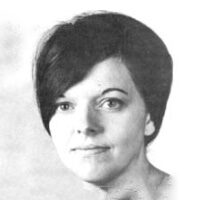Elizabeth Pond
- 1969

Fellowship Title:
- Vietnam
Fellowship Year:
- 1969
The Chau Trial I: Prologue
Saigon Tran Ngoc Chau languishes in jail for not turning in his brother, a North Vietnamese spy. Ten years, the sentence reads. And thereby hangs a tale that is at the same time high drama and a political landmark in South Vietnam. Both drama and analysis will be presented here in a series of three newsletters. This one gives the cast of characters and the backdrop. The second will comprise a poor man’s transcript made from a running translation at Chau’s four-day trial in March. So for as is known, this is the only public record of the trial. The third newsletter will explore the aftermath of the trial. There are several reasons for this lengthy treatment. First, the Chau affair is, quite simply, a whopping good spy story and Perry Mason scenario rolled into one. Second, it forms a case study which captures all the tangled threads: a cruel civil war with brothers on opposing sides; involute Vietnamese politics; the difficulties of American attempts at grooming leaders; the hazards of American disengagement; the
Sunday in Saigon
The two boys, stooped on the sidewalk in front of the rows of jars, scrutinize the 45 goldfish and gesture the comparative merits of each. The objects of their attention swim in incessant truncated figure eights in bottle after bottle, as their stocky proprietress regards the boys impassively. Crowds eddy through the narrow passageway left between the makeshift sidewalk stands with their tarpaulin roofs. Oblivious to the jostling, the boys deliberate for ten minutes, then with some quick bargaining hand over 50 piasters. Without once losing a drop of water or her jaded expression, the proprietress nets the winner in a plastic bag, cascades fish and water into another plastic carrying bag, squeezes excess water back into the original jar, and secures the bag with a looped rubber band. The boys rise and set off in the melee, shielding their prize with elbows and frowns. On either side apathetic rabbits and chickens, sometimes sharing the same woven cages, await their fate. Plumbing faucets and joints, Samsonite luggage, C-rations, canned Chinese delicacies, new Sony radios, and
The Fading of the Neo-Can Lao Party
Like everything political in South Vietnam, the neo-Can Lao party too has proved evanescent. Plans are going ahead for the formal founding of the Republican Mass Party, as it is now called, but it is not to be the strong central force its leaders had originally hoped for (See EP-2). The reasons for this development lie in conflict of interests among the initial organizers of the party and in general reluctance of Vietnamese to commit themselves politically, given the uncertainties of American troop withdrawal and therefore of internal Vietnamese politics. The consulting architects of what might have been a new Southern Can Lao were Nguyen Cao Thang, Mrs. Ngyen Thi Hai, Senator Tran Chinh Thanh, and Cao Xuan Vy, the original organizer of Ngo Dinh Diem’s Republican Youth. Nguyen Cao Thang, according to one informed source, was seeking to Protect the sizable fortune amassed from his pharmacy wholesaling and. also to prove further his Political usefulness to President Nguyen Van Thieu. Thang is one Of Thieu’s closest political advisers, serving in his most public role
Prague: One Year Later
“To Czechoslovakia,” I proposed as we raised our glasses. “Ah, you are an optimist,” Zdenek responded sardonically. He, like every other Czech, was a pessimist. Things were worse now than in the last years of President Antonin Novotny’s rule. They would get worse still, with police harassment escalating to arrests and sentences of unknown severity. The situation would remain bad for a long time, with no hope of rescue as there was under the Nazi occupation in World War II. “You’ve come to see the end,” was another friend’s opening greeting. “There is no place to go for your family, for yourself, no private place,” commented a third. “Everyone is nervous and neurotic and drinks like a fish.” “It was happier before our ‘friends’ came,” said one grandmother simply. The faces of all of them showed the familiar Czech mix of pain and laughter to have shifted in favor of pain in the 15 months since the Soviet invasion. The Sword For a nation so swiftly grown accustomed to the gaiety and spontaneity of
Vietnamese Politics: Longer Term
Saigon – After two years of deliberation and maneuvering Nguyen Van Thieu has crossed the Rubicon. He is organizing a new party with its nucleus in the army and giving its formation top priority. All indications are that the South Vietnamese President is no longer equivocating but has finally made his decision. He is turning to military hard-liners and former Diemists as his primary political base. The move can be compared only with Ngo Dinh Nhu’s formation of the Can Lao party in the mid-fifties. This party gradually became Nhu’s personal intelligence and enforcement agency in asserting Ngo Dinh Diem’s paramilitary control over the country. With this move a new era has begun. Thieu is finally shifting away from his long-held negative strategy of dispersing his rivals but not building any political structure of his own. Two diametrically opposed projections for the future arise from this development. In the optimistic analysis, Thieu now feels himself firm enough in the saddle to control whatever political apparatus he builds. He will be able to use the
